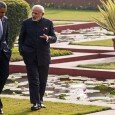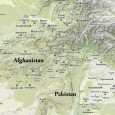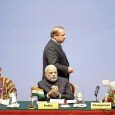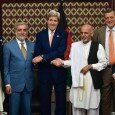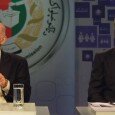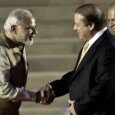By Rahimullah Yusufzai –
Despite a long reign and charges of massive corruption, Hamid Karzai’s brother is raring to keep the presidency home, come 2014
Afghanistan’s next presidential election is due in 2014, but one candidate with a familiar surname has already started preparations to contest the polls. He is Abdul Qayyum Karzai, President Hamid Karzai’s elder brother. In fact, President Karzai would have liked to be a candidate again, but he cannot contest for a third term under Afghan constitution. Though he has been in the saddle since December 2001, Karzai was first elected president in 2004 in a landslide victory against his main opponent, Mohammad Yunis Qanuni, and then in 2009 with a lesser margin in a tough contest with his former foreign minister, Dr Abdullah.
Karzai’s political rivals are still wary of him as they suspect that he could find a way to contest the next election by manoeuvring to amend the constitution. On his part though, President Karzai has repeatedly said that he won’t be a candidate in the 2014 polls. This has opened the way for the 55-year old Qayyum Karzai to enter the presidential race. The president however, has yet to comment on his brother’s candidature. It would be difficult for him not to support Qayyum in case the family decides to field him as its candidate for the office.
Other presidential candidates are sometimes mentioned in the media and political circles but a formal announcement of candidature would happen closer to the polls. The opposition groups, which lack unity and are dominated by non-Pashtuns, would be hoping to put up a joint presidential candidate to defeat the nominee of President Karzai or someone emerging as a consensus contestant fielded by groups representing the majority Pashtuns. This may not happen if the past is any guide. A non-Pashtun candidate for president would need the support of all the minority ethnic groups to have any realistic chance of defeating a Pashtun contestant.
“Having built political alliances in the country and due to their high-profile international contacts, the Karzais believe Qayyum Karzai would have a fair chance of winning the next election”
Dr Abdullah, leader of the Change and Hope movement, had polled 30.6 percent of the valid votes in the 2009 presidential election against Hamid Karzai’s 49.7 percent and he would certainly consider trying his luck again in the 2014 race. Yunis Qanuni, who lost to Hamid Karzai in the 2004 presidential election obtaining only 16 percent of the votes, is Dr Abdullah’s ally nowadays and so is Afghanistan’s former intelligence chief Amrullah Saleh but both are politically ambitious and would weigh their options before making up their mind. Late Tajik warlord and defence minister Ahmad Shah Masood’s younger brother Ahmad Zia Masood, who served as President Karzai’s vice-president from 2004- 2009 but has now turned foe, would also want to play a role in determining the outcome of the next presidential election as a candidate or kingmaker. Uzbek warlord General Abdur Rasheed Dostum and Shia Hazara strongman Mohammad Mohaqqiq, too, had contested the 2004 election for president and lost after 10 percent of the vote. Persuading them to back a consensus non-Pashtun candidate would require much effort.
A woman candidate, Masooda Jalal, contested the 2004 election and lagged far behind Hamid Karzai and others. The name of Fouzia Kofi, the female lawmaker from Badakhshan, has also been mentioned as a likely presidential contestant in 2014. The names of President Karzai’s education minister Dr Farooq Wardak and his former interior minister Hanif Atmar have also figured occasionally as likely candidates. Both are Pashtuns and performed relatively well as ministers but they would need strong backing from political factions operating in Afghanistan to become serious contenders for the job. However, the most keenly watched in the run-up to the 2014 presidential election would be the Karzai family as Qayyum Karzai would be the man to beat.
The announcement about Qayyum Karzai’s plans to contest the election was made recently by the eldest brother, Mahmood Karzai. Ironically, Mahmood Karzai at one stage in the recent past had declared that he wanted to form his own political party and become a presidential candidate once Hamid Karzai’s term expired in 2014. He had stated on the occasion that his philosophy was “free market, free people” and his platform would be “to free the Afghans from the world of ideologies, government control and religion.” It is possible that Mahmood Karzai, who is a US citizen, didn’t become a candidate to avoid problems with the law as once in the past he was the focus in a corruption probe by the federal prosecutors in New York. Also, someone wanting to free the religiously conservative Afghan people of religion won’t stand a chance of winning an election in Afghanistan.
Being the eldest brother, age could also have been a factor in stopping Mahmood Karzai from becoming the presidential candidate. Qayyum Karzai has yet to publicly announce his decision to fight for the top job. Perhaps, it is a bit early to do so and, therefore, he would wait for the opportune time to make the announcement. It seems the Karzai family won’t easily let go its political power after having dominated Afghanistan’s politics for more than a decade in the post-Taliban period. Besides, having built political alliances in the country and due to their high-profile international contacts, the Karzais believe Qayyum would have a fair chance of winning the next presidential election.
The family also has immense wealth and those with money and muscle dominate politics and win elections in present-day Afghanistan. Qayyum Karzai, who has lived for years in the U.S. like his other brothers, served as a member of Afghanistan’s National Assembly, known as Wolesi Jirga, before resigning in October 2008 citing health problems. It is said that the-then assembly Speaker, Yunis Qanuni, brought him and other lawmakers prone to absenteeism from the parliament under pressure by deciding to maintain a register of attendance.
As Qayyum rarely attended sessions of the assembly, he opted to quit his seat. It appears that poor health was cited as reason for resigning as it was convenient to do so. Earlier in 2003, President Karzai using his authority had nominated Qayyum as a member of the Constitutional Loya Jirga, which was tasked to approve the draft of the new constitution for the country. The Karzai brothers own a chain of restaurants in the U.S. serving traditional Afghan food. Qayyum, who lived in Columbia, Maryland before returning to Afghanistan when Hamid Karzai ascended to power, owned the “Helmand” restaurant in Baltimore. He had earlier obtained a Masters of Arts degree in the U.S. and become part of the family business of running Afghan restaurants. Qayyum is often credited with undertaking back-channel diplomacy with the Taliban and one of his visits to Saudi Arabia a couple of years ago is often mentioned as evidence that he was in touch with some Taliban officials using the Saudis as intermediaries.
“The U.S. sometimes becomes impatient with Hamid Karzai due to his ineffectiveness as president and on account of the high levels of corruption but it cannot do much for want of a viable replacement”
Nothing came out of this diplomacy. The Taliban have consistently denied having ever held talks with the Afghan government. The Karzai family owes its origin and name to Karz, a village sited close to Kandahar city. The Karzais are from the influential Popalzai Durrani clan. President Karzai’s late father Abdul Ahad Karzai was a member of parliament and close to King Zahir Shah. Controversy has dogged the Karzai family in the past decade. Hamid Karzai’s rise with U.S. backing raised eyebrows and his 2009 election victory was contested due to charges of rigging.
His half-brother Ahmad Wali Karzai before his assassination in Kandahar last year was criticized for monopolizing power and doling out favours in the family’s native Kandahar province. The U.S. media also sometimes linked him to drug-trafficking, but the Karzais firmly denied any such links. Mahmood Karzai isn’t new to controversy either. He was accused a few months ago by the Afghan authorities of being a defaulter of the Kabul Bank, which almost collapsed after the emergence of a scandal involving the disappearance of nearly one billion dollars in loans in 2010 and was salvaged by injecting state funds into it.
Denying the accusation and blaming President Karzai’s political rivals for launching the campaign to defame the Karzai family, he claimed that he had paid back his $2 million loan from Kabul Bank. Mahmood Karzai, Vice-President Mohammad Qasim, Fahim’s brother Haseem Fahim and the kith and kin of several other members of the Afghan ruling elite were among those who secured huge loans from the Kabul Bank without collaterals and most defaulted in payment. Another controversial project in which the Karzai family, particularly Mahmood Karzai, became involved was the mega housing project, Aynomina, spread over 10,000 acres of land on the outskirts of Kandahar city. Mahmood Karzai owned 20 percent shares in the American-style housing development complex set up on land technically owned by the Afghan military. However, controversies and scandals until now have failed to drag down President Karzai or other members of his family. In fact, the U.S. sometimes becomes impatient with Hamid Karzai due to his ineffectiveness as president and on account of the high levels of corruption in his government but it cannot do much for want of a viable replacement.
The writer is a veteran journalist based in Peshawar






















































































